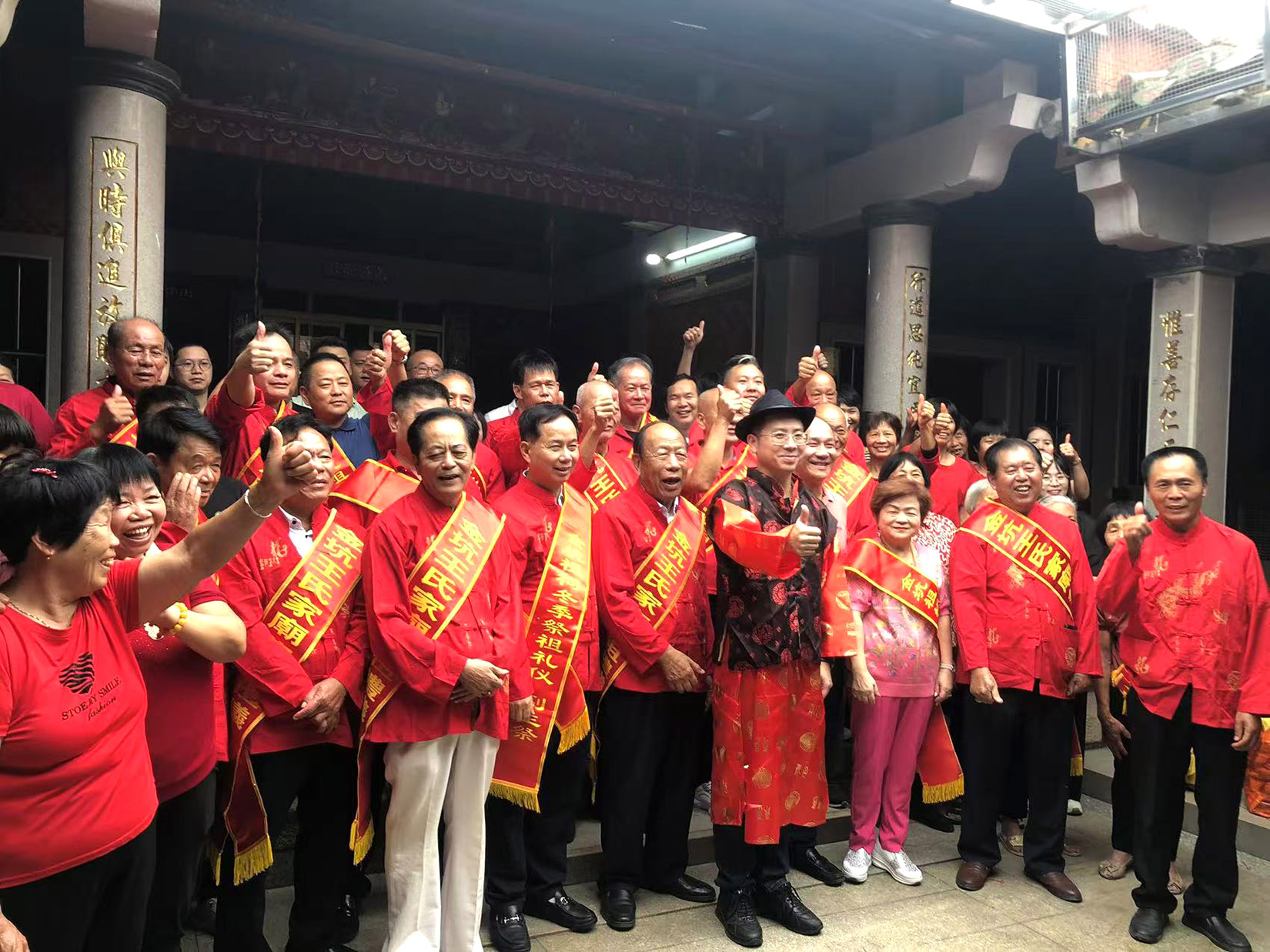Ancestral connections across Strait stretching back generations form unbreakable link

Editor's note: The Taiwan question is a key focus for China and the international community. China Daily is publishing a series of reports to track hot Taiwan-related topics and address disinformation from the Democratic Progressive Party administration.
With ancestral legacies spanning centuries, it's not uncommon for Taiwan people to embark on journeys to the Chinese mainland to seek out their roots.
One such traveler, Wang Tien-shan, a 43-year-old entrepreneur from Taipei, recalled his ancestral homage in Nan'an, Quanzhou, Fujian province, in October. Surrounded by kin in the ancestral temple, Wang, holding an incense stick, expressed his enduring desire to uncover his family history.
"Kneeling before my ancestors' tablets, I felt a profound sense of homecoming, a reconnection to my origins evoking a profound sense of belonging and rootedness," he said.
For many individuals in Taiwan, spanning diverse backgrounds, professions and political affiliations, tracing their ancestry back to the mainland, particularly Fujian, is a prevalent theme. This practice reflects historical passages that have forged familial connections across the Taiwan Strait, binding the two sides through shared heritage.
About 80 percent of the Taiwan population can trace their ancestry back to Fujian, as throughout history, there have been numerous instances of large-scale population movements to Taiwan. In the Qing Dynasty (1644-1911), administrative systems were established on the island, leading to a peak in travel and development between the island and the mainland.
READ MORE: Devotion to Mazu stretches from Fujian to Taiwan
Zhu Dingbo, the former deputy head of the China Museum for Fujian-Taiwan Kinship in Quanzhou, Fujian, said Fujian people, guided by clan ties, played pivotal roles in Taiwan's early development, establishing communities reminiscent of their Fujian origins.
Their nostalgic replication of village names and ancestral customs in Taiwan underscored this deep connection, with more than 400 pairs of villages sharing names across the Strait, and some 20,000 pairs of villages tracing lineages back to the same root on the mainland, he said.
These pioneers transplanted their traditions, erecting ancestral temples mirroring those in Fujian and meticulously documenting their lineage in family trees. Tombstones in Taiwan bear inscriptions of Fujian hometowns, affirming roots and preserving ancestral ties.
Today, in southern Fujian, people's family genealogies usually record their early ancestors engaging in trade, fishing and business activities after arriving in Taiwan, Zhu said.
"All these traces serve as evidence of the interconnected bloodlines between both sides of the Strait," he said.

Reuniting families
For Wang from Taiwan, finding his mainland relatives was made possible with the help of traces left by his ancestors who moved to Taiwan over 200 years ago. Descended from Qing Dynasty merchants, his family's roots spanned from Fujian to Taiwan, trading camphor.
The family tomb in Taipei hints at their origins in Wurong, modern-day Nan'an, Quanzhou. Generations thrived in Taiwan before a branch returned to Fujian in the early 1900s, losing contact.
In 2010, Wang ventured to the mainland for work, founding a biotech startup in Wuhan, Hubei province, monitoring herbal medicine quality to improve its export.
"Good medicinal herbs lead to good medicine, so we must trace them back to the source. Similarly, I also want to trace my own origins for a clear path forward," he said.
Despite his rich family history, Wang felt unsure of where to begin. In 2023, he expanded operations to Fujian due to the province's progressive policies on connecting traditional Chinese medicine standards across the Strait. This move reignited his quest.
Collaborating with the Wang family association in Quanzhou, he uncovered preserved genealogical records of mainland relatives, aligning perfectly with his Taiwan lineage. The mainland records detailed their ancestors' passage to Taiwan and that they were also seeking their Taiwan relatives.
Recalling the scene of his first meeting with relatives from the mainland, Wang said it took him some time to sort out the generational hierarchy as the mainland side had more generations. Therefore, facing someone over 30 years his senior, Wang said: "Brother, I'm back!"
Wang said the best inspiration from his family history is his ancestors' resilience and innovative spirit in developing Taiwan, and he now echoes this spirit, crossing the Strait from Taiwan to the mainland for personal growth.
Feeling a resonance with his ancestors, Wang said, "It's in my genes, pushing me to challenge myself and create a stronger me."
He is the first from his family in Taipei to venture to the mainland. Currently serving as the deputy head of the Taiwan-funded Enterprises Association in Wuhan, he said he intends to help young Taiwan people find opportunities on the mainland.
Strengthening bonds
Chen Binhua, spokesman for the State Council Taiwan Affairs Office, said, "Honoring one's ancestors and cherishing one's homeland are fine traditions of the Chinese nation."
When compatriots in Taiwan return to their ancestral hometowns, they are always warmly welcomed by their kin on the mainland, he said, welcoming more to go back to see the development of their homelands.
Former Democratic Progressive Party lawmaker Kuo Cheng-liang visited Fujian last year to honor his ancestors, and said that the bond of history, culture and bloodline was at its strongest.
Despite moving many netizens, Kuo's visit was met with a backlash from some within the DPP.
Chen said, "It is disgraceful and shameful to see some politicians in Taiwan making disparaging remarks out of separatism attempts and forgetting their own roots."
A recent change in wording on the website of the island government's "executive yuan" describing the island's population has stirred controversy, with critics accusing the administration of attempting to downplay the Han Chinese majority.
The website previously stated that "Han people account for 96.4 percent of the household-registered population in Taiwan". However, the latest version of the site now reads: "Currently, 2.6 percent of the household-registered population in Taiwan are ethnic minorities, 1.2 percent are newly arrived residents, and the remaining 96.2 percent are other population."
The revised phrasing, which omits any direct reference to "Han people" and labels the vast majority as "others", has triggered heated debate. Opposition Kuomintang lawmakers sharply criticized the change, accusing the DPP administration of engaging in "de-Sinicization" efforts.
ALSO READ: Taiwan singer keeps fighting after life-saving surgery in Hangzhou
Zhu, from the museum, is an expert in genealogical research who has helped over 300 individuals trace their ancestral roots on the mainland. He said that regardless of political backgrounds and party affiliations, people in Taiwan are very enthusiastic about connecting with their ancestral homes.
"In almost every family in Taiwan, their elders have mentioned that their ancestors had instructed them to return to the mainland to seek their roots and connect their family genealogy," Zhu said.
He suggested taking measures to guide and encourage grassroots clan organizations in mainland villages to assist Taiwan compatriots in returning to their ancestral roots and connecting with their heritage.
"Reunification would come very soon if everyone returned to their ancestral homelands to form a bond with relatives," he said. "There will never be warfare as we are all brothers and sisters, and descendants of the same bloodline."
Contact the writers at zhangyi1@chinadaily.com.cn


